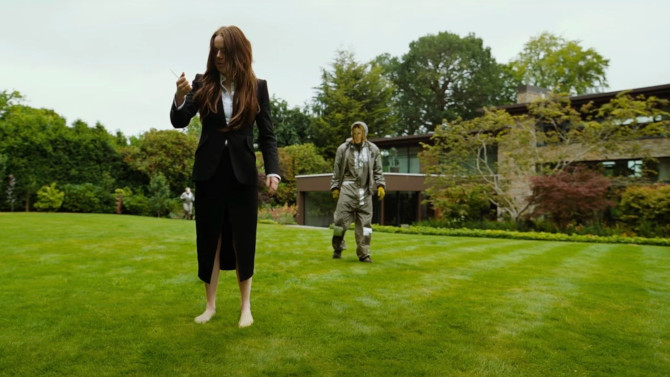
A Bee in Your Bonnet or: A Bug in the System
Sometimes a movie doesn’t fit nicely within a genre box. In today’s case, the film touches on bizarre sci-fi dialogue, brings forth some satirical dark comedy, plenty of drama and thrills, and centers on a crime... in other words, it’s another unique vision from Yorgos Lanthimos (The Lobster; The Favourite) – titled Bugonia (2025). . . inspired by the 2003 South Korean motion picture Save the Green Planet! by Jang Joon-hwan. Falling down the rabbit hole with Teddy (Jesse Plemons – Hostiles; Game Night) and his autistic cousin/helpful sidekick Don (Aidan Delbis – an excellent amateur casting of an autistic man), they have done copious amounts of research on the recesses of the internet into an alien species called the Andromedans – that are supposedly secretly residing amongst us while pulling the puppet strings.
-
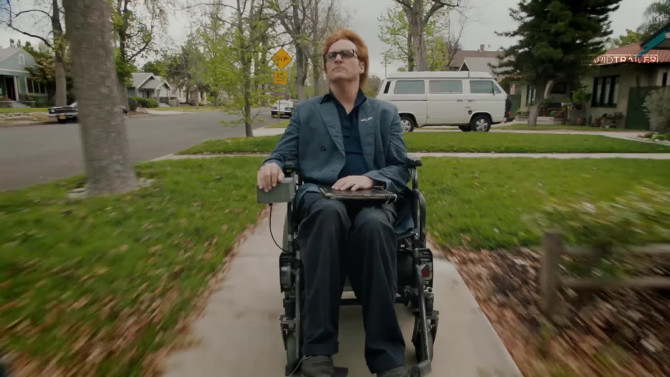
Wheelchair Accessible
Don't Worry, He Won't Get Far on FootAugust 24, 2018Ah, the good old days. . . when you could drive around drunk, blowing chunks out of the window along the way. Of course, I’m being facetious, but this folly-filled sequence, set in an era when this happened more than anyone would like to remember (the 1970s), is a lead in to the first of two cruxes at the centre of the politically incorrect leaning titled feature, Don’t Worry, He Won’t Get Far on Foot (2018) – co-written and directed by Gus Van Sant. Centred on John Callahan (Joaquin Phoenix), the fateful sequence finds him in the passenger seat while said vomiter, Dexter (Jack Black), drives them to their next alcohol-fuelled party – falling asleep at the wheel, the brutal accident leaves Callahan a paraplegic.
-
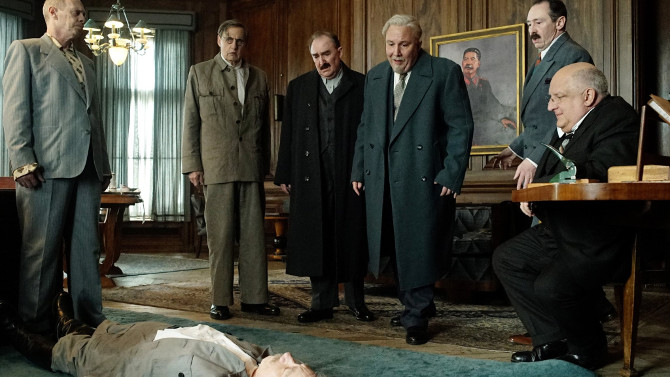
A Communist Plot
The Death of StalinAugust 17, 2018Conniving, chaos, cruelty, and paranoia – four words that aptly describe today’s film. . . and, whose first letters provide a hint as to the setting: that’s right – CCCP. The Death of Stalin, Armando Iannucci’s 2017 comedic spin on the historical event, follows in the vein of his BBC series The Thick of It and HBO show Veep, as well as his film In the Loop, a razor sharp political satire with quick banter, clever wordplay, and a more than interesting topic. Of course, if you know the work of Iannucci, it will be quite obvious that the lexicon of such a film is much more expansive than the four words used to open the piece – fear and power also come to mind. Going hand in hand, it is this power through fear that has Andreyev (Paddy Considine), a theatre manager that has not recorded a broadcast that Josef Stalin (Adrian McLoughlin) now wants a copy of, panicking to keep the band and audience in their seats to do it all over again. . . it is also the same dread that steers Stalin’s guards to stand pat after hearing a thump from within the leader’s room – when in actuality, the dictator is slowly dying, steeped in his own urine. It is this irony, and grey area comedy, that comes from a pitch dark premise – finding an absurd humour in the disturbing story.
-
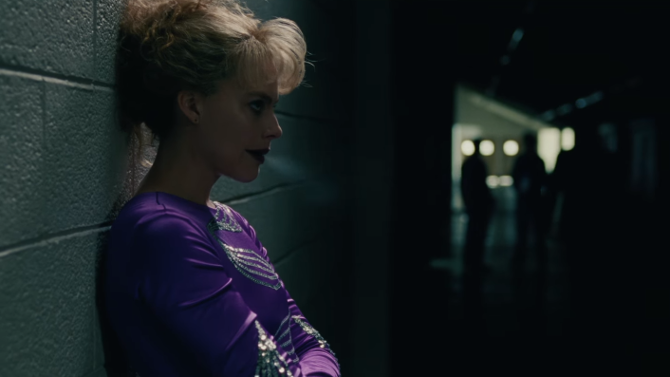
Spinning a Tale
I, TonyaFebruary 23, 2018Like landing a triple axel, figuratively speaking, I, Tonya writer Steven Rogers and director Craig Gillespie (Lars and the Real Girl) conquer the difficult feat of bringing the complicated career of figure skater Tonya Harding to vivid life on the big screen. Relishing in the ‘perception of truth’, Rogers and Gillespie develop a bio-pic mockumentary style approach, each character having their own version of the story. Complex in its narrative direction, multiple persons have their say, sometimes breaking the fourth wall and talking directly to the audience – at one point, Harding (Margot Robbie – Academy Award nominee for Best Lead Actress), gun in hand, makes it quite clear that this portion of the tale never actually happened – a rebuttal to her husband, Jeff Gillooly (Sebastian Stan), and his unflattering perspective.
-
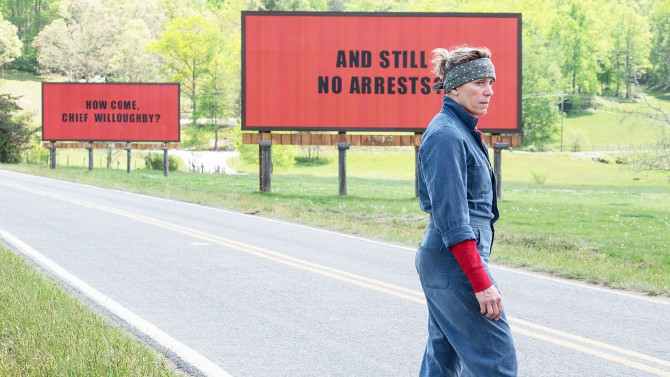
Advertising Gets Results?
Three Billboards Outside Ebbing, MissouriFebruary 20, 2018Good things come in threes – case in point, Martin McDonagh’s Three Billboards Outside Ebbing, Missouri. His third full length feature, it has earned him his first Best Picture nomination at the Academy Awards (expected to be one of the frontrunners this year), while the motion picture has also garnered its three main performers Best Actress/Supporting Actor nods, and, though it may be a tad of a stretch, when eliminating the four above mentioned Oscar nominations, it has also earned three other chances for the elusive statuette (for Original Score – Carter’s Burwell’s composition brimming with mysterious western melancholy; Original Screenplay; and Film Editing). Interestingly, the film could very well have had another title, “Three Letters from a Sheriff in Ebbing, Missouri” – but more on that later. Bringing to life another fascinating dark premise, McDonagh scribes a heart-wrenching tale of how human beings deal with anger, loss, hate, guilt, grief, injustice, and the seemingly cruel fate of life, yet, as always, combined with his sharp wit – a rare movie that, despite its pitch black subject matter, will have you laughing on and off throughout, much like his earlier gems, 2008's In Bruges and 2012's Seven Psychopaths.
-
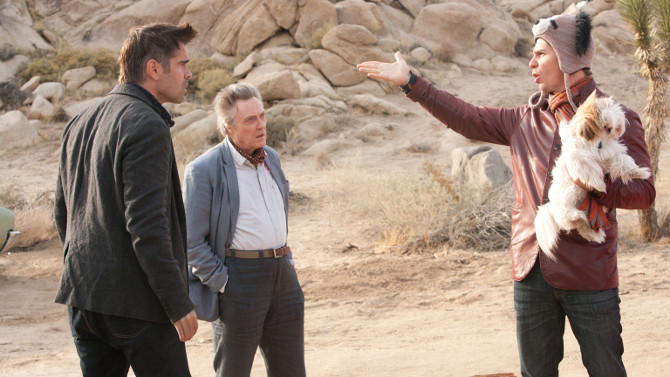
Following the Paths of Psychos
Seven PsychopathsFebruary 6, 2018One of the most originally creative scripts to be found on either side of Ebbing, Missouri, Martin McDonagh’s Seven Psychopaths, released in 2012, is an example of the writer/director’s many talents (twisty nuanced stories, richly drawn characters, beautiful dialogue, and so much more) that have made his most recent effort, hinted at above, Oscar bait this Awards season. With a screenplay that keeps the audience on its toes for quite a while, we are often guessing what we are truly watching. At first glance a meta cinematic commentary on writing a screenplay – Colin Farrell’s Marty has writer’s block, it is perhaps best summed up after he heads out into the desert with his two buddies. . . leading to one of them, Sam Rockwell’s Billy, describing how his treatment of the script should conclude. With Marty in disbelief at its over-the-top violence, the third friend, Christopher Walken’s Hans responds, perhaps somewhat surprisingly, “It’s got layers, you know. . . it’s got. . . It’s got many layers”. Adding another ‘layer’ of meta, we eventually realize that not all that is written on the page is fictional and that we may be watching flashbacks from several characters’ pasts.
-
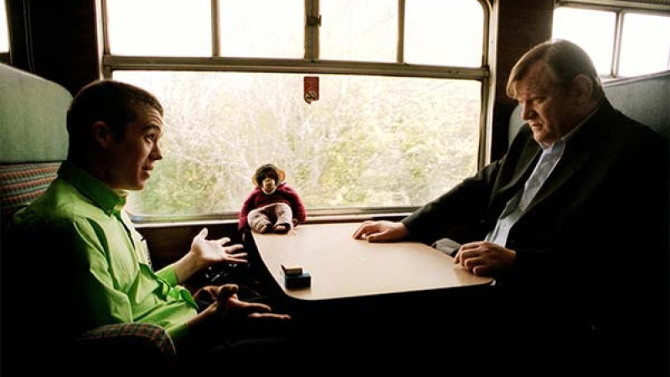
Train Wreck
Six ShooterJanuary 9, 2018There are many actors and directors that I have long championed, one of which is filmmaker Martin McDonagh. More of a household name today than a few days ago, this past Sunday he took home both Best Screenplay and Best Motion Picture - Drama at the 2018 Golden Globes for his film Three Billboards Outside Ebbing, Missouri (the feature also won for Best Actress - Drama: Frances McDormand, and for Best Supporting Actor: Sam Rockwell). First and foremost a British/Irish playwright, McDonagh made his feature film debut in 2008 with the tragically under-seen In Bruges – a movie that will be reviewed on Filmizon.com in due course. This was followed by a 2012 American/British co-production, Seven Psychopaths, another intriguing film. His third is the award winner from Sunday. . . though many probably do not know that McDonagh won an Academy Award back in 2005 for Six Shooter, earning the golden figurine for Best Short Film, Live Action (his true first effort into the foray of film making).
